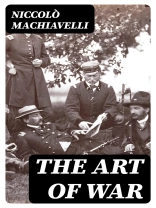In ‘The Art of War, ‘ Niccolò Machiavelli presents a profound treatise on military strategy, intertwining philosophical insights with practical advice. Written in the early 16th century, this work reflects the tumultuous political landscape of Renaissance Italy, where city-states vied for power. Machiavelli’s literary style is characterized by clarity and directness, employing a dialogue between a general and his student to explicate the principles of warfare, the organization of troops, and the importance of discipline and strategy. Through this dialogue, readers gain an understanding of the interplay between war and politics, uncovering the necessity of military preparedness in achieving and maintaining civic stability. Machiavelli, a diplomat and historian, drew on his experiences in the tumult of Italian wars and the collapse of traditional medieval structures to inform his writings. His keen observations on power dynamics and human nature shape his arguments in ‘The Art of War, ‘ where he emphasizes the importance of a well-trained citizen army over mercenaries, reflecting his belief in the tie between military prowess and civic virtue. This book is essential for anyone seeking to grasp the intricate relationship between warfare and statecraft. It serves as a foundational text for military and political strategy, revealing insights that remain relevant in contemporary discussions of governance and power. Readers will find Machiavelli’s analysis not only intellectually stimulating but also practically applicable to modern strategic thought.
Sobre o autor
Niccolò Machiavelli (1469–1527) stands as one of the most influential political theorists and writers in Western intellectual history. Born in Florence, Italy, during the Renaissance, Machiavelli served as a statesman for the Florentine Republic, an experience that furnished him with a pragmatic understanding of governance and power dynamics. After his fall from political favor, Machiavelli devoted himself to scholarship, producing major works that came to shape political theory. His seminal treatise, ‘The Prince’, remains his most renowned work, offering a realistic analysis of political leadership and a guide to statecraft, wherein he infamously advocated for the notion that the ends justify the means. ‘The Art of War’ (1521), another significant contribution, explores military strategy and organization, reflecting Machiavelli’s engagement with ancient Roman tactics and his own contemporary military knowledge. This work cements Machiavelli’s status as a military theorist, diverging from the conventional diplomacy-focused approach of his era. His literary style, characterized by lucidity and a certain candor in addressing the stark realities of political maneuvering, has continued to incite both commendation and controversy. His writings laid the foundation for modern political philosophy, signaling a departure from traditional notions of ethics and morality in politics and favoring a more secular and pragmatic approach to leadership and statecraft.












